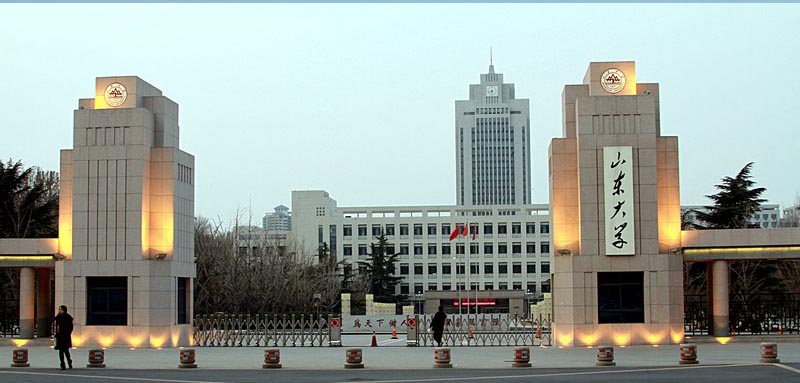
INTRODUCTION
Shandong is a public comprehensive university in Shandong, China. It is one of the largest universities in China by student population and is supported directly by the national government. Shandong University is one of the initiative universities of modern Chinese higher education. Its medical school, established in 1864, signified the beginning of modern Chinese higher education. Its main body, Shandong Imperial College established in 1901, was the second national university in China, only after the Imperial University of Peking. Moreover, it was the first university to be established and run in accordance with a chartered constitution, and was credited by the imperial court as the model to be followed for all Chinese provinces. The establishment of Shandong Imperial College had not only laid down the foundation for its century-old development, but also served as the blueprint for all the other modern institutes of higher education, which were rising at that time. It blazed a trail in China for the future of institutions of higher learning.
Shandong University, under the direct jurisdiction of the Ministry of Education, is a key comprehensive university with a long history, a variety of disciplines, strong academic strength, and distinctive characteristics, which has great influence both at home and abroad. Shandong University is a member university of Project 211 and Project 985, two national key construction projects to support the development of high-quality universities.
Shandong University has seven campuses, all of which are located in three different cities (Jinan, Qingdao and Weihai). A campus to the northeast of the port city of Qingdao is under construction. Shandong University comprises 8 campuses are - (Jinan Central Campus, Hongjialou Campus, Baotuquan Campus, Qianfoshan Campus, Software Campus, Xinglongshan Campus, Qingdao Campus and Weihai Campus).
The university currently has 3 affiliated hospitals, 4 non-subordinate affiliated hospitals and 11 teaching hospitals. It also enjoys a teaching and administrative staff of 10,200 (including those at the Weihai Campus and the 3 affiliated hospitals included). Its full-time student population totals up to 60,000, of which 43,000 are undergraduates, 15,000 are postgraduates and more than 1,600 are international students. It also has an excellent faculty team of 1,046 professors, including 721 Ph.D supervisors. Shandong University is one of those of the largest ranges of academic disciplines in China. There are at present 13 general disciplines for undergraduates and postgraduates, namely philosophy, economics, law, education, literature, history, science, engineering, agriculture, medicine, military science, management and arts. There are 41 first-level doctoral programs, 55 first-level master degree programs, 28 professional doctoral and master degree programs, 116 programs for undergraduates, 29 mobile post-doctoral research stations, forming a complete system for cultivation of talent.
- Shandong University Qilu Hospital,
- Second Hospital of Shandong University
- Stomatology Hospital of Shandong University
The SDU Library is one of the first member libraries of China Academic Library & Information System (CALIS) in higher education institutions, the CALIS service centre of Shandong Province, the disciplinary centre of China Academic Social Sciences and Humanities Library (CASHL), the working station of new science and technology reference of the National Ministries of Health and Education, and a secretariat of the Library Commission of Higher Education Institutions, Shandong Province. The working aims of the university library are: Keeping forging ahead, blazing new trails, endeavoring to promote the building of a first-class university of the world.
International Education
The College of International Education was established in 1994. It consists of the Department of Chinese Language Teaching, the Department of Education, the Department of Preparatory Study for International Students, and the Language and Culture Promotion and Research Center. It is mainly engaged in international students' education, training professors for teaching Chinese abroad, the development of the Confucius Institute, and the development of the Chinese National Base for Chinese Language Promotion. The College is responsible for the admission, teaching, management and services for international students. It boasts top-quality faculty and management personnel, and a wide range of teaching and living facilities. Since the 1980s, more than 10000 international students from over 110 countries have studied at SDU.
The College of International Education was established in 1994. It consists of the Department of Chinese Language Teaching, the Department of Education, the Department of Preparatory Study for International Students, and the Language and Culture Promotion and Research Center. It is mainly engaged in international students' education, training professors for teaching Chinese abroad, the development of the Confucius Institute, and the development of the Chinese National Base for Chinese Language Promotion. The College is responsible for the admission, teaching, management and services for international students. It boasts top-quality faculty and management personnel, and a wide range of teaching and living facilities. Since the 1980s, more than 10000 international students from over 110 countries have studied at SDU.
To meet the demand for Chinese language teachers for international students, the College has established a comprehensive personnel training system, offering Bachelor's, Master's and Doctoral degree programs in education. Its goal is to produce qualified teachers to teach Chinese to people of different cultures. The College is also responsible for the development of overseas Confucius Institutes. So far, it has set up 8 Confucius Institutes and classrooms in South Korea, Mongolia, Singapore, Australia, France, the Netherlands and Thailand. The Base for Traditional Chinese Culture Research and Experience is a national base and plays an important role in teaching Chinese to international students. It undertakes language and cultural research and dissemination, which includes cultural experience and the development of cultural products. Shandong University has been actively involved in international research collaborations, such as the AMS Project led by Noble Laureate Prof. Samuel Ting and the ATLAS Project with CERN. Shandong University, in cooperation with Chinese Language Council International, has also established 7 overseas Confucius Institutes in France, Singapore, Australia, South Korea, Mongolia, and the Netherlands.
Accommodation
In present Shandong University has two accommodation buildings specially provided for international students. The International Students' Complex locates on the Center Campus and Baotuquan Campus, which has sports ground, gymnasium, a cafe, a shop, public kitchens, a laundry room, public washrooms, shower rooms, and a boiler room where boiled water is available.




